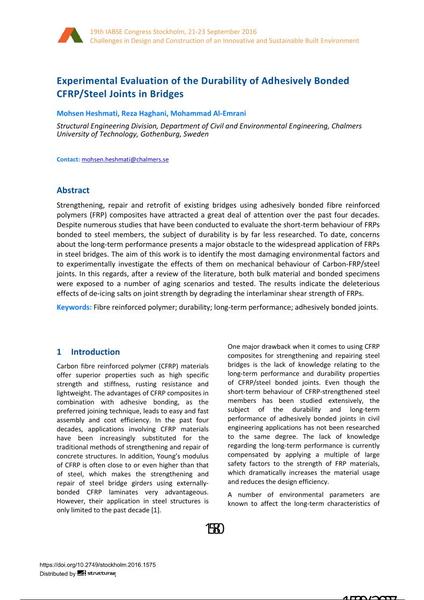Experimental Evaluation of the Durability of Adhesively Bonded CFRP/Steel Joints in Bridges

|
|
|||||||||||
Détails bibliographiques
| Auteur(s): |
Mohsen Hedhmati
(Structural Engineering Division, Department of Civil and Environmental Engineering, Chalmers University of Technology, Gothenburg, Sweden)
Reza Haghani (Structural Engineering Division, Department of Civil and Environmental Engineering, Chalmers University of Technology, Gothenburg, Sweden) Mohammad Al-Emrani (Structural Engineering Division, Department of Civil and Environmental Engineering, Chalmers University of Technology, Gothenburg, Sweden) |
||||
|---|---|---|---|---|---|
| Médium: | papier de conférence | ||||
| Langue(s): | anglais | ||||
| Conférence: | IABSE Congress: Challenges in Design and Construction of an Innovative and Sustainable Built Environment, Stockholm, Sweden, 21-23 September 2016 | ||||
| Publié dans: | IABSE Congress Stockholm, 2016 | ||||
|
|||||
| Page(s): | 1580-1587 | ||||
| Nombre total de pages (du PDF): | 8 | ||||
| Année: | 2016 | ||||
| DOI: | 10.2749/stockholm.2016.1575 | ||||
| Abstrait: |
Strengthening, repair and retrofit of existing bridges using adhesively bonded fibre reinforced polymers (FRP) composites have attracted a great deal of attention over the past four decades. Despite numerous studies that have been conducted to evaluate the short-term behaviour of FRPs bonded to steel members, the subject of durability is by far less researched. To date, concerns about the long-term performance presents a major obstacle to the widespread application of FRPs in steel bridges. The aim of this work is to identify the most damaging environmental factors and to experimentally investigate the effects of them on mechanical behaviour of Carbon-FRP/steel joints. In this regards, after a review of the literature, both bulk material and bonded specimens were exposed to a number of aging scenarios and tested. The results indicate the deleterious effects of de-icing salts on joint strength by degrading the interlaminar shear strength of FRPs. |
||||
